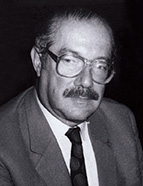

Encompassing studies on the Mesolithic, Megalithic, and Roman periods, M. Farinha dos Santos' archaeological work is primarily focused on prehistoric studies, particularly artistic ones. However, he also gives significant attention to other periods and themes, including Megalithic culture, Roman history, and heritage protection. His scientific work is distinguished by the rigour of his fieldwork, meticulous recording of excavated artefacts, and the integration of methods from other sciences, such as geophysics — tested in the Escoural Cave, which he investigated over four campaigns (1963-1966) funded by the Calouste Gulbenkian Foundation (established in 1956) and with support from the MEPLV.
M. Farinha dos Santos shares his work with his peers through oral presentations at national and international gatherings, including the National Archaeology Congresses in Portugal and Spain, the Portuense Archaeology Congresses, the Archaeological Days of the Association of Portuguese Archaeologists, the congresses of the International Union of Prehistoric and Protohistoric Sciences, and the Luso-Spanish Congresses for the Advancement of Sciences. His studies were also published in over 150 papers between 1958 and 1999, namely in specialised journals: Antiquity, Zephyrus, Les Dossiers de l´Archéologie, O Arqueólogo Português, Ethnos, Boletim de História e Arqueologia [Bulletin of History and Archaeology], Anais da Academia Portuguesa da História e Filatelia e Numismática [Annals of the Portuguese Academy of History, Philately and Numismatics].
In 1967, the Spanish archaeologist Martín Almagro Basch (1911-1984) invited M. Farinha dos Santos to travel to Madrid to deliver two lectures at the Complutense University's Faculty of Philosophy and Letters and another at the Consejo Superior de Investigaciones Cientificas (1939).
By raising local awareness of the value of archaeological heritage and deterring unscrupulous collectors and dealers, as the cornerstones of heritage preservation, M. Farinha dos Santos contributes to the dissemination of knowledge across diverse audiences. To this end, he delivered lecture series on the Emissora Nacional de Radiodifusão [National Radiobroadcasting Corporation], gave television interviews, held conferences across the country, and published articles in national and regional periodicals, including Diário de Notícias, O Século, A Capital, Diário de Lisboa, Jornal de Notícias, Jornal do Comércio, A Voz, Diário da Manhã, and O Comércio do Porto. He also directed the "Verbo" collections “Historia Mundi – as Grandes Civilizações” [Historia Mundi – the Great Civilisations] (40 volumes) and “Biblioteca das Civilizações Primitivas” [Library of Primitive Civilisations] (14 volumes), contributed entries to the Enciclopédia Luso-Brasileira de Cultura [Luso-Brazilian Encyclopaedia of Culture], and published “Pré-História de Portugal” [Prehistory of Portugal], with three editions (1972, 1974 and 1985). He taught free introductory courses in archaeology from 1966 to 1972 at the Centro Piloto de Arqueologia do Secretariado para a Juventude do Ministério da Educação Nacional [Pilot Archaeology Centre of the Youth Secretariat of the Ministry of National Education], at the Saturday Free Courses organised by Joaquim Veríssimo Serrão (1925-2020) in Santarém in the early '80s, and at the Free Courses held at the Autonomous University in the late '90s.
This work is financed by national funds through FCT - Foundation for Science and Technology, I.P, in the scope of the projects UIDB/04311/2020 and UIDP/04311/2020.
